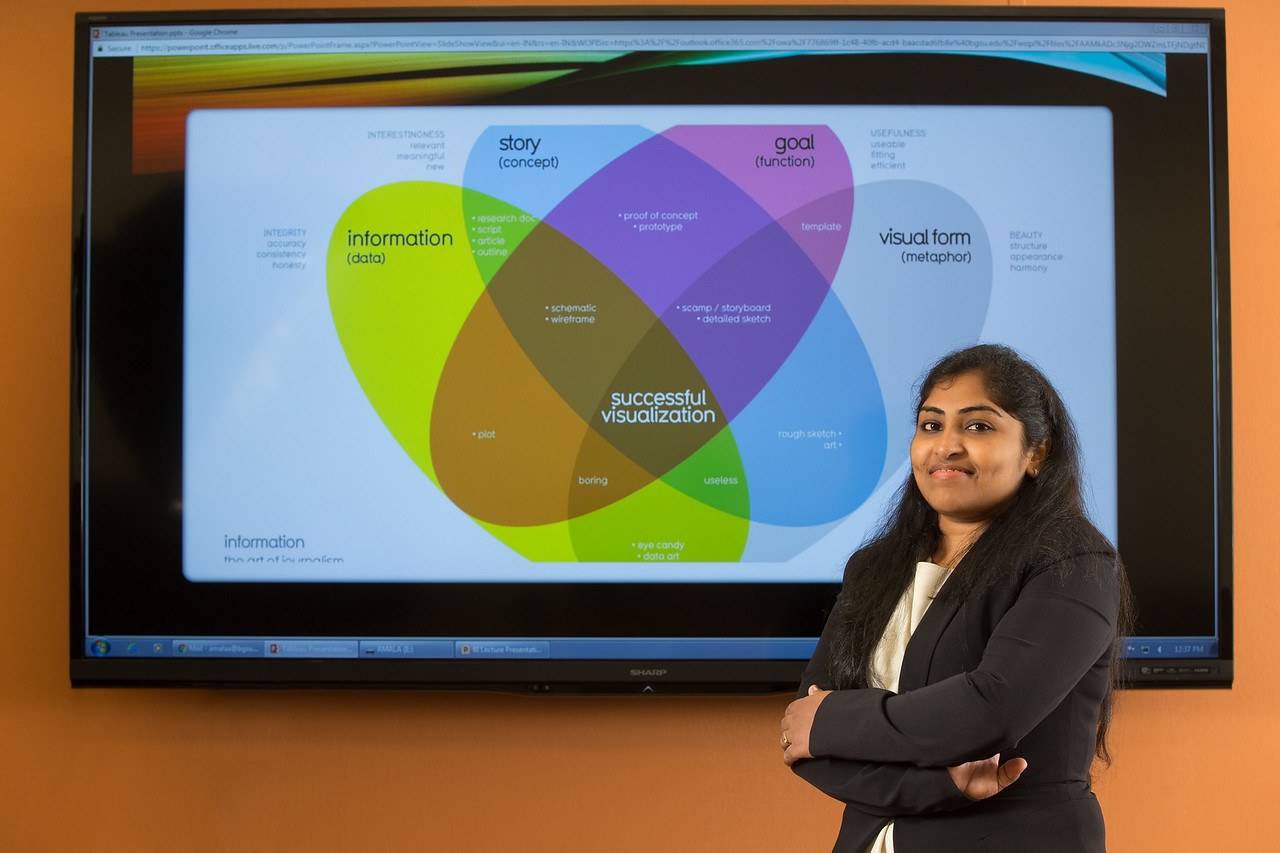
Doctorate
Data Science
The BGSU Ph.D. in Data Science program prepares individuals to be the next generation of responsible data science leaders across academia and industry.
With a 100 percent focus on the skills and challenges of data science, this program is multidisciplinary and grounded in the concepts and skills of data science.
The role of data scientist is routinely ranked among the top five best jobs in the United States by Glassdoor.com. With a job satisfaction of 4.3 out of 5 and more than 7,500 job openings, individuals with data science expertise are well-positioned for success in the job market.
Graduates of the BGSU Ph.D. in Data Science program are ready for careers in academia, government departments, big-name tech companies and industry and university research labs.
100 percent dedicated to data science
The BGSU doctorate in data science is one of the few dedicated Ph.D. data science programs currently offered in the United States.
This multi-disciplinary program engages expert faculty from two BGSU colleges. Faculty from the College of Arts and Sciences teach mathematics and statistics as well as computer science. Instructors from the Schmidthorst College of Business teach applied statistics and operations research.
Unique among technical degrees, the BGSU doctorate in data science also requires courses in communication and ethical data use. You will be aware of the extremely relevant ethical issues related to gathering and analyzing big data, and you will be able to communicate your findings to a wide variety of audiences.
Graduate assistantships for the doctorate in data science are available on a competitive basis. Assistantships include a scholarship and a stipend. Undergraduate GPA, GRE/GMAT scores, letters of recommendation, the student's statement and other materials are used to select graduate assistants.
Data scientist is ranked in the top five best jobs in America, according to Glassdoor’s annual jobs report.
Career opportunities
When you graduate with a BGSU doctorate in data science, you will have developed the level of knowledge and skills necessary to take you on one of two different paths.
First, you may will seek academic positions where you lead the development of data science and similar education programs. The popularity of master’s degree programs in the US has created a significant need for faculty with doctoral credentials.
Second, both private industry and the public sector require high-level data scientists as leaders in applied innovation. The scale at which data science models are applied and their many hidden impacts on everyday life make ethical decision-making and communications skills vital for practitioners in the field.
While master’s students are able to understand and utilize data science, doctoral students are able to develop and lead the field.
The future for data science doctoral graduates is bright in every field.
Career paths
- Business Intelligence Analyst
- Machine Learning Engineer
- Data Mining Specialist
- Business Analyst
- Marketing Analyst
- Data Analytics Manager
- Data Engineer
Quick Facts from the Bureau of Labor Statistics
Curriculum
Students completing the doctorate in data science will gain competency in data science’s core concepts and techniques, which come from computer science and statistics.
You will build on prerequisite coursework that includes differential, integral and multivariate calculus, linear algebra and a senior-level introduction to probability and statistics. You will also need a high skill level in programming languages such as C, C++, Java and Python and understanding of data structures and computer algorithms. See the admission process for other requirements.
At BGSU, candidates for the doctorate in data science will develop appropriate techniques to analyze structured, unstructured and dynamic datasets. You will also learn how to understand the principles of analytical methods and articulate the strengths and limitations of analytical methods. You will learn the skills needed to communicate effectively with technical and non-technical audiences.
The program is designed to identify and respond to ethical concerns with the impact, provenance and use of data use while developing new techniques for analyzing complex datasets.

Sample courses
- Data Visualization
- Machine Learning
- Big Data Analytics
- Statistical Learning
- Data Science Exploration & Communication
- Ethical Issues in Data Science
- Advanced Data Mining
Financial Aid
Scholarships and stipends are available for this program. For more information, please contact the department. Domestic students enrolled in four (4) or more credit hours are eligible to apply for financial aid using the Free Application for Federal Student Aid (FAFSA) to calculate student contribution and financial need.
Assistantships are available on a competitive basis. Assistantships include a scholarship and a stipend. Undergraduate GPA, GRE/GMAT scores, letters of recommendation, the student's statement and other materials are all used in the decision process. The department reserves the right to adjust the level of funding conditional on the availability of funds or the student's academic progress.
The doctorate in data science is a part of the Departments of Computer Science and Mathematics in the College of Arts and Sciences and Applied Statistics and Operations in the Schmidthorst College of Business
Accreditation
Bowling Green State University [BGSU] is accredited by the Higher Learning Commission. BGSU has been accredited by the Higher Learning Commission since 01/01/1916. The most recent reaffirmation of accreditation was received in 2022-2023, with our next reaffirmation of accreditation scheduled for 2032-2033. Questions should be directed to the Office of Institutional Effectiveness.
Request Information
Updated: 09/25/2024 03:10PM

